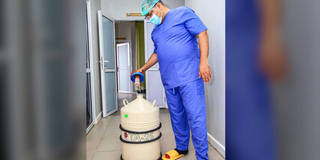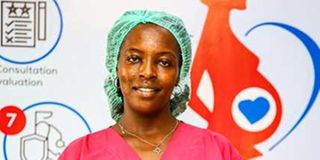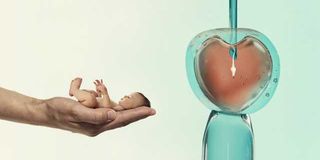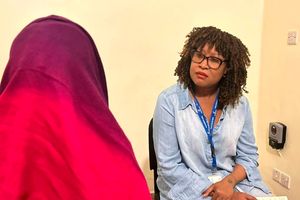
The number of Kenyan women having children through IVF (in vitro fertilisation) or sperm donation without partners has increased.
At a small fertility clinic in Nairobi, women sit waiting to enter one of six rooms. All wear jeans and designer sports shoes, legs crossed, their long nails flipping through smartphones.
It is 7am on a cold Saturday. Of the 12 women present, some will meet with doctors to discuss having a child without a partner.
They want to know if they can import sperm from American or European sperm banks, and how much it would cost. Others are in same-sex relationships, seeking information about having a child with the help of a sperm donor.
At another IVF clinic in Nairobi, on a Thursday, the reception area is being cleared. A high-profile woman who values privacy above all else has paid Sh80,000 as a consultation fee to see a fertility specialist without the scrutiny of others.
The number of Kenyan women having children through IVF (in vitro fertilisation) or sperm donation without partners has increased. More educated, financially stable career women are acknowledging their biological clocks and taking control of their reproductive futures.
With each passing season, numbers continue to grow as IVF awareness increases and stigma decreases. Faith Kemunto, a fertility advocate at Victoria IVF and Fertility Centre, reports they have seen a 20 percent quarterly growth in enquiries.
At the clinic, Faith notes there were 231 walk-in enquiries in January alone, while February bookings for IVF procedures reached 76. "The bookings for procedures tend to be higher because of our partnership with different agencies, including international ones," says Faith.
She explains that Kenya attracts international clients due to fewer IVF restrictions.
"There is no age restriction for those above 45 years in Kenya, plus we allow commercialisation of IVF, sperm and egg donations, and surrogacy," Faith says. She reports that their client base is 80 percent Kenyan and 20 percent foreign, with equal interest between men and women.
"Holiday periods show a significant peak in bookings, which is associated with children usually being home during these times. This tends to create loneliness for individuals, making them more likely to approach us," Faith reveals.
Changing landscape of parenthood
Dr Rajesh Chaudhary, an IVF specialist and gynaecologist at Fertility Point, discusses the changing landscape of parenthood.
Women today aren't just waiting for the "right time" to have children—they can now control when and how they become parents. Even more remarkably, egg and sperm banking allows women to postpone pregnancy for years or even decades, resuming their plans when they're ready.
"There has been an increasing use of donor sperms by women who are mostly single in their late 30s and 40s. The reason behind them using donor sperm is their personal choice," he says.
This growing use of sperm donation enables women who are single, in same-sex relationships, or facing fertility issues to take control of their reproductive choices.
Some women have focused on careers and personal development before settling down, only to discover they're ready for a child without having found the right partner. "We have women who are well-established in their careers and financially independent but they are not interested to wait for marriage to have children," Dr Chaudhary says.
Male infertility is another factor prompting heterosexual couples to use donor sperm. In these cases, sperm donation offers an alternative to adoption while allowing the woman to experience pregnancy.
Another emerging trend involves women with specific genetic preferences. "Some want a donor from a specific ethnicity, like Caucasian origin, and we help them with that, whether through IUI or IVF," says Dr Chaudhary.
However, medical professionals note that in Kenya, women typically prefer local donors to avoid uncomfortable questions and stereotypes. No one wants to repeatedly explain why their child looks different. "Do you have an Indian husband? We have never seen you with a Chinese man."
How does the process work?
The process of conceiving with donor sperm is straightforward, though medical professionals note it varies depending on a woman's reproductive health. The two main options are Intrauterine Insemination (IUI) and In Vitro Fertilisation (IVF).
"For a woman who is young, ovulating and whose reproductive organs are functioning normally, IUI is an option. During her ovulation, we inseminate the donor sperm directly into the uterus after preparing it in the lab," Dr Chaudhary explains.
This method is less invasive and works best for women with no underlying fertility issues. However, for older women, those with blocked fallopian tubes, or those requiring a more controlled fertilisation process, IVF is recommended.
"In IVF, we retrieve the woman's eggs, fertilise them with donor sperm in the lab and then transfer the resulting embryo into the uterus. It is also the preferred method for lesbian, gay, bisexual, transgender and queer (LGBTQ) couples," says Dr Chaudhary.
Dr Sarvaiya, another IVF expert at Victoria IVF and Fertility Centre, explains how technological advancements have improved success rates. "There have been great advancements in how we match donors and ensure compatibility. In the past, choosing a donor was limited, but now we can screen for genetic conditions and even select donors based on physical traits if requested."
While sperm donation offers hope to many, Dr Chaudhary emphasises the importance of considering health risks, particularly age-related complications.
"The best reproductive age for a woman is after 21 years, but the younger you conceive, the better the pregnancy outcomes," he explains.
"As you age, conditions like hypertension in pregnancy (preeclampsia), gestational diabetes, and complications from fibroids or adenomyosis become more common. That's why it's essential to do a full health check-up before planning a pregnancy."

Fertility Point In Vitro Fertilization(IVF) and Fertility Specialist Dr. Ruchik Sarvaiya opens a sperm bank during an interview at Victoria IVF and Fertility Center at Doctors Park Building, Nairobi on March 12, 2025.
For women over 35 who want to conceive through IVF, the doctor notes they must also consider egg quality.
"After 40 years, the egg quality declines. But if you froze your eggs in your younger years, you have better chances of success, however there is no guarantee," he says.
The success rates of pregnancy using donor sperm largely depend on the woman's age and the quality of her eggs. "For women under 35 years, the success rate of IVF with donor sperm is quite high, about 60 to 70 percent. But for women over 40 years, it drops to around 20 to 30 percent," says Dr Chaudhary.
Is donor sperm anonymous?
Dr Sarvaiya explains that ensuring a sperm donor closely matches the woman's preferences is a credible and accurate process.
"When a woman seeks a sperm donor, we first conduct a thorough screening to understand her specific needs and preferences. We then provide her with a selection of donor profiles—typically four or five—that match what she wants.
"These profiles are completely anonymous but they have essential details such as blood group, skin tone, and other physical attributes."

Victoria IVF and Fertility Center Specialist Dr. Ruchik Sarvaiya during an interview at his office at Doctors Park Building, Nairobi on March 12, 2025.
When it comes to the donors, the doctor says that each donor undergoes medical testing before being added to the database.
"We conduct complete blood count to screen for viral markers such as Human Immunodeficiency Virus (HIV), Human hepatitis B surface antigen (HBsAg), Venereal Disease Research Laboratory test (VDRL), and Hepatitis C virus (HCV), as well as sugar level assessments. If a recipient has a family history of genetic conditions, we also conduct additional genetic testing."
The same process also applies to egg donors, which helps ensure that the recipient has the best possible match based on their personal preferences and medical compatibility.
Who donates?
Faith Kemunto, a fertility advocate at Victoria IVF and Fertility Centre, reveals that the majority of egg and sperm donors are university students.
"University students make up 70 percent of donors because recipients often consider the donor's education level. Many associate higher education with intelligence, making well-educated individuals more desirable choices," she explains.

Faith Kemunto, a fertility specialist poses for a photo during an interview at Victoria IVF and Fertility Center at Doctors Park Building, Nairobi on March 12, 2025.
Another group that frequently donates eggs, she adds, is single mothers facing financial difficulties. For them, donation provides much-needed financial relief while also helping another family.
When it comes to recipients, Kemunto notes that the reasons for using donated sperm or eggs vary. For men, it is primarily a medical necessity, while for women, personal choice also plays a role.
"For men, the issue is usually medical. They may struggle with sperm morphology, motility, or count, making natural conception impossible. In such cases, they require donor sperm. On the other hand, many career women today choose to have children independently without a partner. These women deliberately opt for donor sperm to conceive and raise their children alone," she says.
One of the most common concerns, especially among women considering egg donation, is whether the child will resemble them.
"Many people come in sceptical, asking, ‘Will the child look like me? The embryo won’t have my genetic material.’ It’s a major worry. But physical traits aren’t always entirely inherited from one side. The sperm comes from the husband, and the baby grows in the mother’s womb, which influences certain characteristics. A mother’s thoughts during pregnancy, how she nurtures the child—these environmental factors also play a role. It’s a mix," she explains.
Kenya’s sperm banks source donations both locally and internationally. Aside from local donors, they also have Caucasian, Asian, Chinese, and mixed-race donors. Some specific categories include Ethiopian, Eritrean, and Rwandese donors.
A backup plan for the future
For women who are not yet ready to conceive but want to preserve their fertility, egg freezing has become an increasingly popular option.
"You can freeze your eggs for as long as you want," explains Dr Chaudhary. "Recently, a baby was born from an egg that had been frozen for over 20 years. The only risk is that not all eggs survive the thawing process—out of ten frozen eggs, two or three may not make it. However, the rest are usually viable for fertilisation."

The process of conceiving with donor sperm is straightforward, though medical professionals note it varies depending on a woman's reproductive health.
He cautions, however, against relying solely on frozen eggs. "Freezing gives you flexibility, but it does not guarantee success. It’s always best to consult a fertility specialist rather than assume everything will go as planned."
For women considering egg freezing, Dr Chaudhary advises doing so before the age of 35, when egg quality is at its peak. "If you freeze your eggs at 25 or 30, your chances of conceiving later are much higher compared to freezing at 40," he says.
Dr Sarvaiya agrees, noting that advancements in assisted reproductive technology have given women greater control over their reproductive choices. "We are seeing more women take charge of their fertility, and that is a powerful shift. With the right medical support, they can experience healthy pregnancies and fulfilling motherhood journeys."
How much does it cost?
The cost of fertility treatments varies depending on the procedure chosen and whether additional services, such as egg freezing or surrogacy, are involved.
"Basic IVF, which includes ovarian stimulation, egg retrieval, fertilisation, and embryo transfer, costs around Sh500,000 in Kenya, though prices may vary slightly between clinics," says Dr Chaudhary. "Freezing embryos for future use costs an additional Sh100,000 per year."
For those using donor sperm, the cost is approximately Sh50,000, depending on the donor's profile. "If you prefer a Caucasian or highly educated donor, the price may be higher," he adds.
Some women may also require donor eggs, which further increases the cost. "This typically ranges between Sh150,000 and Sh200,000, depending on the agency and the donor's background. If surrogacy is needed, the clinic charges for the medical procedures, but the surrogate’s fee is negotiated separately."
Psychological turmoil
The journey of assisted reproduction is not just a medical process; it can also be an emotional and psychological burden. Joy Maele, a counselling psychologist at The Retreat Limited, explains that the psychological effects often include loneliness and emotional strain.
“You’re looking at becoming a single parent without co-parental support, which can be emotionally taxing,” she says.
Another key concern, according to Maele, is identity. “A child may grow up asking, ‘Who is my biological father?’ This can lead to complex conversations that many parents may not fully anticipate.”
These emotional challenges, she notes, can impact a child's upbringing, especially if the mother is not mentally prepared for such discussions.
Stigma and societal judgment also play a significant role. Many women grapple with uncertainty about societal and cultural expectations.
“As a woman, you’re expected to marry and start a family in the conventional way. If I choose IVF, will I be judged? Will I be stigmatised? In many cultures, IVF is not seen as the ‘right’ way to start a family,” she explains.
This pressure can lead to social anxiety, making some women withdraw from social interactions. In extreme cases, it may result in deep isolation and loneliness.
Given these psychological effects, Maele strongly advises women to seek counselling before proceeding with IVF. “Guidance is essential to help you process the decision. Ask yourself, ‘Why is this important at this time?’” she says.
Beyond therapy, she emphasises the importance of a strong support system. “Family and friends provide the most practical and realistic support. Surrounding yourself with people who understand and respect your decision is crucial.”
Ultimately, Maele urges women to have open discussions with professionals and their support network before making this life-changing decision.
“This is a lifelong choice that affects more than just one person. It’s not only about the woman, but also the child and how they fit into society. A conversation with a professional and family allows you to consider aspects you may not have thought about. That way, by the time you decide, you’ve evaluated it from all possible angles.”











